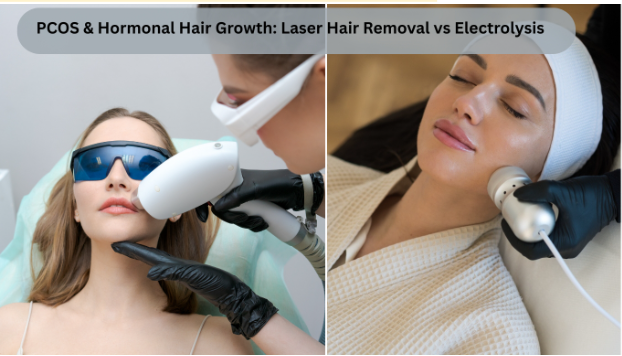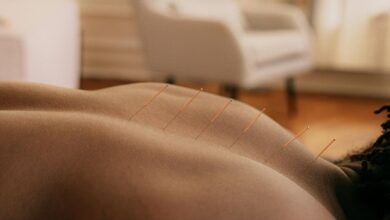PCOS & Hormonal Hair Growth: Laser Hair Removal vs Electrolysis

Dealing with unwanted hair caused by PCOS can be frustrating, especially when it seems like nothing truly works. Shaving, waxing, and threading may give temporary relief, but the hair often grows back thicker and darker. For women managing PCOS-related hirsutism, this can have a real emotional impact and affect self-confidence.
If you’re searching for longer-lasting results, laser hair removal and electrolysis are the two proven options worth considering. Both treatments target the hair follicle directly, helping to reduce or stop hair growth altogether.
However, they work in very different ways, and understanding those differences is key when choosing the right approach for PCOS and hormonal hair growth.
In this guide, you’ll learn exactly how each treatment works, how effective they are for hormonal hair, and which might be the best fit for your skin, hair, and lifestyle.
PCOS & Hormonal Hair Growth: Laser Hair Removal vs Electrolysis
Women with PCOS often struggle with excessive hair growth caused by hormonal imbalances. Traditional methods like shaving or waxing can be frustratingly short-lived. Laser hair removal and electrolysis offer longer-term solutions by targeting the hair follicle directly, helping reduce unwanted hair and restore smoother, more confident skin.
How Laser Hair Removal Works for PCOS
Laser hair removal uses concentrated light energy to target the pigment (melanin) inside hair follicles. The warmth from the laser damages the follicle, slowing down or stopping future growth.
- Works on dark, coarse hair and lighter skin tones.
- Newer laser technology can safely treat more diverse skin types.
- Provides significant hair reduction, though some regrowth is possible due to hormonal changes.
Laser hair removal is particularly effective for PCOS patients who experience dense hair growth on areas like the chin, jawline, chest, or back. It’s fast, efficient, and reduces hair thickness over time.
How Electrolysis Works for PCOS
Electrolysis is the only FDA-approved permanent hair removal method. It works by giving a tiny probe into each individual follicle and using a small electrical current to destroy the follicle’s growth centre.
- Works on all hair colours, skin tones, and textures.
- Provides permanent results once the follicle is destroyed.
- Ideal for smaller, stubborn areas like the chin, upper lip, or sideburns.
Because each follicle is treated individually, electrolysis can be time-consuming, but it’s the best choice for hair that lasers may not catch, such as blonde, grey, or fine regrowth caused by PCOS hormones.
Effectiveness Comparison for PCOS & Hormonal Hair Growth
Both treatments can make a noticeable difference, but they don’t perform identically.
- Laser Hair Removal offers a major reduction in hair density and growth speed. However, hormonal fluctuations common with PCOS can trigger new growth over time.
- Electrolysis gives permanent results but often takes longer since each follicle must be treated one by one.
For many PCOS patients, the most effective approach is a combination of both: laser for large areas and electrolysis for small, resistant patches.
Treatment Areas and Suitability
Different methods suit different body areas:
- Laser Hair Removal: best for larger areas like the face, chin, chest, back, abdomen, and thighs.
- Electrolysis: ideal for small, stubborn spots, such as the upper lip, sideburns, or jawline.
Because PCOS hair growth varies from person to person, a custom treatment plan often delivers the best results.
Treatment Time & Number of Sessions
Hormonal hair growth typically requires patience and consistency.
- Laser Hair Removal: usually 6-12 sessions, spaced every 4-6 weeks.
- Electrolysis: needs more sessions overall, since each follicle must be treated individually.
Both treatments may require maintenance visits to manage any new hair growth caused by hormonal changes.
Pain, Side Effects & Safety
Both treatments are generally safe when performed by qualified professionals.
- Laser Hair Removal: may cause mild discomfort, redness, or temporary pigmentation changes (rare).
- Electrolysis: can be slightly more painful and may cause temporary swelling or tiny scabs as the skin heals.
When done correctly in a professional clinic, both options are low-risk and deliver reliable long-term results.
Cost Comparison
Pricing can vary depending on area size, hair density, and number of sessions needed.
- Laser Hair Removal: higher upfront cost, but covers larger areas with fewer sessions.
- Electrolysis: lower per-session cost, but adds up over time due to the number of treatments required.
The overall investment depends on your treatment goals, but both can be cost-effective in the long run compared to lifelong waxing or shaving.
Which is Better for PCOS?
It depends on your needs:
- Laser Hair Removal is great for fast, visible reduction across larger areas.
- Electrolysis is best for permanent removal of finer, resistant hairs.
For many with PCOS, combining both treatments provides the smoothest, most lasting outcome.
Conclusion
PCOS-related hair growth requires a tailored, patient approach. While laser hair removal offers quick results and convenience, electrolysis delivers true permanence for stubborn hairs. No single method suits everyone, so the best path is often a combination designed around your skin, hair type, and hormonal needs.
If you’re considering Electrolysis for Permanent Hair Removal in London, book a consultation with Colaz. Their trained specialists offer safe, professional treatments designed to help you achieve smoother skin and long-term confidence.
FAQs
Can laser hair removal completely stop hair growth for PCOS?
Not always. Laser significantly reduces growth, but hormonal imbalances may cause new hairs to appear. Maintenance sessions can help keep results long-lasting.
Is electrolysis painful?
Electrolysis can be slightly uncomfortable, but most people describe it as a quick stinging or tingling sensation. Topical numbing creams can help ease sensitivity.
Can I do both laser and electrolysis together?
Yes. Many professionals recommend starting with laser for larger areas and finishing with electrolysis for any remaining fine or light hairs.
How long before I see results?
Laser results are noticeable after 3-4 sessions, while electrolysis takes longer since each follicle must be treated individually. Both require consistency for lasting results.
Electrolysis vs Laser Hair Removal: which is better for PCOS?
Both work well, but they serve different purposes. Laser hair removal is ideal for reducing large areas of hair quickly, while electrolysis permanently removes individual hairs, including fine or light ones that laser might miss. Many PCOS patients benefit from using both methods together.




